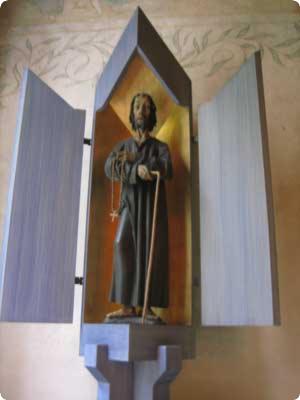Brother Klaus Meditation
The following meditation texts on the subject of Brother Klaus and his wife Dorothée were written by René Grand and presented on the occasion of the 2006 pilgrimage.
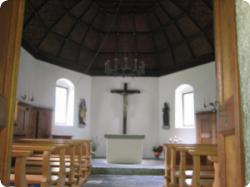
A) Chapel in Ranft
At the age of 50, Klaus left his family to retreat to the solitude of the Ranft. Why? What hasn't been said about this decision? However, it's enough to take a moment to reflect on the atmosphere of prayer and faith that Klaus shared with his family. There is nothing rash about this decision. All witnesses confirm this. Klaus isn't euphoric, it's not a nervous shock. Historical evidence underscores that from childhood, the search for God accompanied this hard-working mountain man. For years, Klaus, with great discretion, prayed, watched, and fasted. His decision may be confusing and difficult to understand. However, it matured slowly and was shared with his family. Klaus confided to a childhood friend, Erni an der Halden, that before leaving his family, he asked God for three graces:
- The grace of the consent of his wife and children.
- The grace to never be tempted to return.
- The grace, if God wills, to go without food and drink.
According to custom at the time, in addition to the consent of his family, he also had to receive the blessing of the Church. This was customary for all pilgrims who set out on the journey and risked not returning.
The calling of Abraham (Gen.1-5)
The Lord said to Abraham, "Go from your country, from your kindred, and from your father's house, to the land that I will show you. I will make you into a great nation, and I will bless you and glorify your name, and your name shall be a blessing. I will bless you and your people, and I will curse anyone who curses you. Through you all the families of the earth shall be blessed." So Abraham went, as the Lord had told him. And Lot, his nephew, went with him. Abraham was 75 years old when he left his country.
Meditation: What am I looking for on this pilgrimage
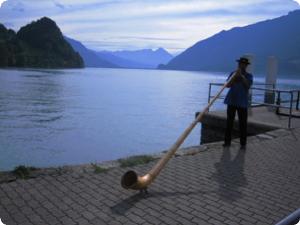
B) Church of Iseltwald:
Brother Klaus an ordinary man addressed by prayer
In May 1447, Niklaus, a well-off farmer, married Dorothée Wyss. She was 15 years old. "They married at the beginning of May, the summer passed quickly, and Dorothée – one evening in October – sat in the kitchen of the new house. The smell of fresh paint and freshly cut wood hung in the air. Klaus was in the stable, busy milking. The first autumn thunderstorm brushed the shingled roof, which was secured with large stones. One could hear the Melchaa rumbling and, behind the house, the three fir trees groaning. Dorothée felt so protected in this house that Klaus had built for her. She stirred the flour soup and from time to time she had to wipe away a tear brought on by the smoke. Then she paused and looked into the flames. She felt a new life sprouting within her. She remembered a day in May, the smell of hay, the meadows full of flowers, and the singing of the birds. On that day they had exchanged vows. She thought of the old priest who had blessed their union and, in his somewhat rude language, had said: "Marriage is like a chicken coop; those on the outside want to get in—God knows why—those on the inside want to get out—something the devil could explain better." Dorothée was happy with Klaus, and what more could she want? (From La couronne invisible, by Michel Jungo.)
But Klaus had been drawn to prayer and solitude since his youth. For years he watched, prayed, and fasted in solitude. His eldest son confirmed this. When he awoke in the night, he heard that his father had gotten up and was praying in the living room. Dorothée knew of the solitary hours in the Valley of Melchaa, which were more necessary to Klaus than bread. (from: Prier 15 jours avec Nicolas de Flue.)
The Prayer of Jesus, (Mark 1:35 and 6:46)
The next morning, after the dark night, Jesus went out into the desert, where he prayed. Simon Peter and his friends searched for him. When they found him, they said to him, "Everyone is looking for you." After the multiplication of the loaves and fishes, Jesus ordered his disciples to cross the lake by boat while he said goodbye to the people. Afterward, he went into the mountains to pray.
Meditation: What is, for me, the most important thing in my life? How much time do I devote to it?
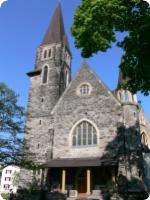
C) Catholic Church Interlaken:
Brother Klaus as a citizen of his country, a just man
One evening, long after the Angelus bells rang, Klaus came home. As Dorothée handed him the soup, he tried to give her a small smile; but his eyes didn't follow him and betrayed a great sadness. Finally, he began to speak: "For months, I've been thinking that I can no longer be a councilor and judge. This time, the cup is full. What I saw today... Do you know Ueli der Körber?" Dorothée nodded her head. "Good! You also know about his misery. He has a little house that will be washed away by the next storm, a meadow full of stones and as big as twice our kitchen, a goat whose ribs you can count, and on top of all that, a little daughter who is almost always sick. Do you think all that is enough for this poor devil? No! Big Heini, the richest farmer in the area, had to move a boundary stone last night to enlarge his property, at Ueli's expense." "What wicked people there are," said Dorothée. "Wait! That's not all. Ueli is going to court. However, the opinions have long been drawn out. The case is clear. And what happens? They drag the case out and tell poor Ueli stories. During this time, Heini doesn't remain idle. He promises the first judge a stere of wood; he forgives a debt to the second; he sends a bale of precious velvet from Milan to the wife of the third. Today we had to judge. I immediately noticed something was wrong. The opinions had been drawn out before the hearing. I could rap on the table, but no one listened. Heini was acquitted for lack of evidence."
(from Prier 15 days with Nicolas de Flüe)
Letter of the Apostle James: The respect we owe the poor. James 2:1+
My brothers, hold the faith in our Lord Jesus Christ without partiality. If a man with a gold ring and fine clothing comes into your church, and a poor man in filthy clothes comes in at the same time, and you look at the rich man and give him the better seat, but say to the poor man, 'You can sit at my feet,' do you not discriminate and pass judgment based on a corrupt consideration? Listen, my brothers! Did not God choose the poor in the eyes of the world to be rich in paradise?
The Last Judgment: “Whatever you did for the least of these, you did for me.”
Meditation: How do I react to injustice: around me? In the world?
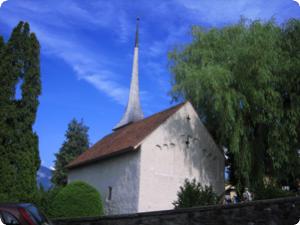
D) Church of United.
His wife Dorothée accompanies her husband Brother Klaus on his spiritual quest
We know very little of Dorothée, too little, almost nothing. Klaus left us only four words of her. "My very beloved wife." A true sign of love, considering the mountain people's shyness at the time and their difficulty in expressing their feelings. But we have no other text. And yet, no one was closer to him in his calling, his journey of faith, his prayers, and even his doubts. Even if she accepted his step, it was probably not in conflict, but with courage and confidence in God's plan, which Klaus demanded. With her consent, she, too, fulfilled God's will. (from: Prier 15 Jours avec Nicolas de Flüe)
"In 1465, Dorothée turned 35. Friends would have given her 30 at most, even though she had already given birth to 9 children. She had hardly any gray hair and a fresh complexion. There was never a shortage of work in the village, not only because the harvest had been plentiful, but also because the father of the family had a number of other responsibilities. On Mondays, he was summoned to the town hall. He was to settle a dispute between the priest and the parish; on Tuesday, he was to pass judgment on a murderer; on Wednesday, as colonel, he had to inspect the troops... It went on like this all week.
Dorothée often had to fulfill the many responsibilities of the house and family alone. It wasn't unusual for her to wait for her husband until late at night to prepare a hot meal for the exhausted Klaus. Occasionally, they would sit together outside the house or in the living room. When he broke his long silence, she let him talk as long as he wanted without interrupting. She nodded her head now and then. She read the reproaches, the recognition, or the praise in his eyes. (from: La couronne Invisible.)
The true kinship of Jesus: Mk,3,31
Then his mother and brothers came and stood outside the house and called him out. Many people were sitting around him, and they said to him, "Your mother and your brothers are outside, asking for you." He replied, "Who are my mother and my brothers?" Whoever does the will of God is my brother and mother.
Meditation: What bond or freedom can I build with my family?
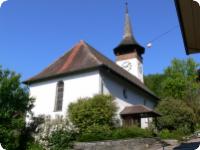
E) Church of Wattenwil:
Brother Klaus seeks his calling, he asks God for his advice
Where must I go? That is the question Klaus asks himself. For fear of becoming a nuisance to his fellow citizens, he does not want to stay in his own country. He sets off towards Alsace, on the border of the Swiss Confederation, to the Hauenstein in the Jura. From there, he sees the town of Liestal in flames and turns back. In a neighboring village, he asks a farmer for shelter so he can live in solitude. The farmer finds his plan laudable but advises him to return to his homeland, as the Swiss are not welcome everywhere, and there are enough uninhabited areas in his country where he can serve God in peace. Klaus turns back that same evening. He sleeps under the open sky and asks God for enlightenment regarding the goal of his pilgrimage. He senses a secret power leading him home. This clarity takes complete possession of him and causes him great pain, as if a dagger were pierced through his intestines. From that day on, until his death, he eats neither solid nor liquid food.
Brother Klaus is not a man who decides alone what he does and where he goes. He walks under the inspiration of grace, as the visions he has had throughout his life attest. Yet he still demands the accompaniment of the Church. Many priests were his spiritual fathers. This is very surprising. We are talking about a man who would soon be venerated as a saint by his fellow citizens. He would never have allowed himself to freely decide where to go or what to do. At every stage of his life, he humbly submitted himself to the scrutiny of the Church. When he decided to fast, he did so only with the permission of his confessor.
(from: Anonymous biography of Brother Klaus.)
Jesus in the Garden of Gethsemane: Mth. 26. 36-41.
Then Jesus came with his disciples to a place called Gethsemane and said to them, "Sit here and wait while I go and pray over there." He took Peter and the two sons of Zebedee with him. Then he was overcome with fear and sadness, and he told them, "Stay here and watch with me!" He went a little farther, threw himself on the ground, and prayed, "My Father, if it is possible, let this cup pass from me. But your will be done." He returned to the disciples and found them sleeping. Then he said to Peter, "Could you not have watched with me for one hour? Watch and pray that you may not enter into temptation. The spirit is willing, but the flesh is weak."
Meditation: Where can I seek help when faced with trials and difficulties?
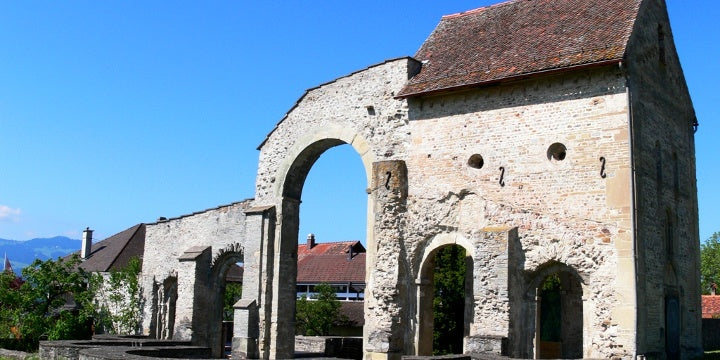
F) Ruins of Rüeggisberg Monastery:
Klaus as a craftsman of peace
The name Klaus von Flüe is found on a list of 699 Swiss soldiers who, in April 1450, rushed to the aid of the city of Nuremberg against the siege of the city by the troops of Margrave Brandenburg. What did this man of prayer think in the face of the drinking parties, the gallant adventures, the traditional looting, and even the massacres organized by his comrades-in-arms the day after their victory? A friend of his youth, Erni An der Halden, who was alongside him in battle, testified: "He inflicted as little harm as possible on his enemies, trying, if possible, to protect their lives. I would like to mention the episode in which Klaus saved the Katharinenthal monastery, in Thurgau, from fire, where its enemies had entrenched themselves." For a long time, military service was part of the duties of the Helvetic citizen. But once withdrawn into solitude, through his intimacy with God, Klaus achieved a freedom beyond all parties. His word was sought, and from then on he was considered a righteous man. Through the inner peace he radiates, he can bring the various antagonists back together.
(Diet of Stans, December 22, 1481.) "Klaus emphasizes that there is no other way to peace than for everyone to seek it within themselves." (from: Prier 15 jours avec Nicolas de Flüe)
One easily recognizes the message of the New Testament: In Bethlehem: the message of Christmas, “Peace to the people whom God loves.” Luke 2:14
To the sick he healed and to the sinners, Jesus said: “Go in peace”
The greeting of the apostles “Peace to this house and to all who dwell in it” Lk. 10.5
On the evening before his death, Jesus said to the apostles, "Peace I leave with you; my peace I give to you, not as the world gives. Let not your heart be troubled, neither let it be afraid." John 14:27
Excerpt from 2 letters dictated by Brother Klaus:
To the City Council of Konstanz:
"As for me, I will use my good will so that my words can lead to peace and salvation. My advice to you is also to be conciliatory in your dealings, since one good deed leads to another."
To the government in Bern:
“Peace always in God, and this peace cannot be destroyed.
Be careful to always seek peace.”
Meditation: With whom should I make peace? With myself or with others?
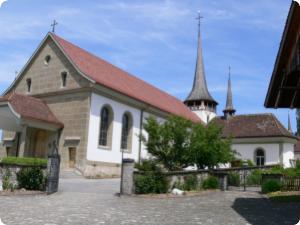
G) Church of Tafers:
Brother Klaus a hermit open to the world
Klaus distanced himself from the world to live in communion with God, far from all distractions. For 20 years, in his small cell in Ranft, at the edge of the forest, he dedicated himself to silence, to the melody of his inner liturgy. Through the narrow window overlooking the small chapel, he attended Mass every day and immersed himself in the mystery of the Cross of Jesus. Through the daily reception of Holy Communion (at that time, devout people received Communion once a month), Klaus received the spiritual nourishment his soul needed and, amazingly, also his physical nourishment. (from, Prier 15 jours avec Nicolas de Flüe)
And behold, this man who has withdrawn from worldly affairs, who makes no noise, who radiates inner peace, this man receives visitors. The man who left his wife and family receives the grace to become a spiritual father to many people. In the afternoons, he receives an army of visitors, all of whom wish to speak with him. Bishops and other famous figures, as well as theological scholars and ordinary citizens, come to this mysterious hermitage to confide their worries to him and ask for his intercession and advice. He shows himself full of kindness to each of them. With his truthfulness and freedom, he reminds everyone of their duty, be they priests or magistrates. Although he receives many pilgrims, he never leaves his small cell for pleasure. Only the love of God and his neighbor or the interests of his soul allow him to leave his solitude. He then wanders, usually at night, so as not to attract people's attention. He returns to his cell in the morning. (Anonymous biography)
Contemplation or action: Mary and Martha Luke 10:38-41
They continued on together and he came to a village. A woman named Martha welcomed him warmly. She had a sister named Mary. Mary sat at the Lord's feet and listened to his words. But Martha was completely absorbed in caring for him. She came to him and said, "Lord, don't you care that my sister leaves all the work to me? Tell her to help me!" The Lord answered, "Martha, Martha, you are worried and troubled about many things. But only one thing is necessary: Mary has chosen the better part, and it will not be taken away from her."
Meditation: When am I happy?
In loneliness?
With my fellow human beings?
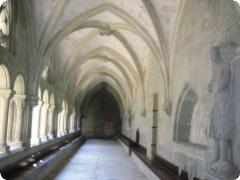
H) Abbey of Hauterive.
The death of Brother Klaus
Klaus grows older in great peace. He knows that at 70 he will have his ultimate encounter with God. And in his faith he does not fear death. Lying on the floor of his cell, he ends his earthly journey in great calm and peace. Dorothée has been called to him. This is the hour of their ultimate marriage. Do you love me? is the question the Risen Christ asks each of us. Klaus can answer with all his heart: Lord, you know everything. You know that I love you. (John 21:17) He never doubted that God loved him first. The gates of heaven open to receive him.
In his life, Brother Klaus performed no miracles. He didn't abandon his family to found a spiritual one. He never sought to gather disciples or pupils around him. He strove to lose himself unrecognized in the large community of worshippers, to listen to God's word and put it into practice. That is the only honor he deserves. All of this led him to an adventure he never dreamed of. (from: Prier 15 jours avec Nicolas de Flüe)
“The attitude of Jesus towards death: the tears before the tomb of his friend Lazarus, the fear of death and the agony in the Garden of Gethsemane, the serenity of the righteous man before Pilate.”
The Song of Praise of the Wise Simeon: (Luke 2:25-32)
At that time, a man named Simeon lived in Jerusalem. He was righteous and devout, waiting for Israel's salvation. The Holy Spirit rested upon him. The Holy Spirit had revealed to him that he would not die until he had seen the Messiah. He was then led by the Spirit into the temple, and when the parents brought Jesus in to fulfill the custom of the Law, Simeon took the child in his arms and praised God, saying, "Now, Lord, you are letting your servant depart in peace, as you have promised. For my eyes have seen salvation, a light for revelation to the Gentiles, and glory for your people Israel."
Meditation at the end of this pilgrimage:
What did I discover?
What to get?
What given?
Prayer of Brother Klaus:
My Lord and my God, take away everything that prevents me from coming to You
My Lord and my God, give me everything that brings me to You
My Lord and my God, take me and give me entirely to You
Story of Brother Klaus
1417: Birth of Niklaus in March, into a well-off farming family, in Flüeli
1447: Marriage to Dorothée Wyss of Oberwilen. 10 children, 5 boys, 5 girls
1467: Klaus leaves his family to live as a hermit
1481: With the encouragement of Brother Klaus, the Swiss reconcile in the Diet of Stans on 22 December
1487: Death of Brother Klaus
1669: Beatification
1947: Canonization of Brother Klaus by Pope Pius XII. Feast on September 25.
